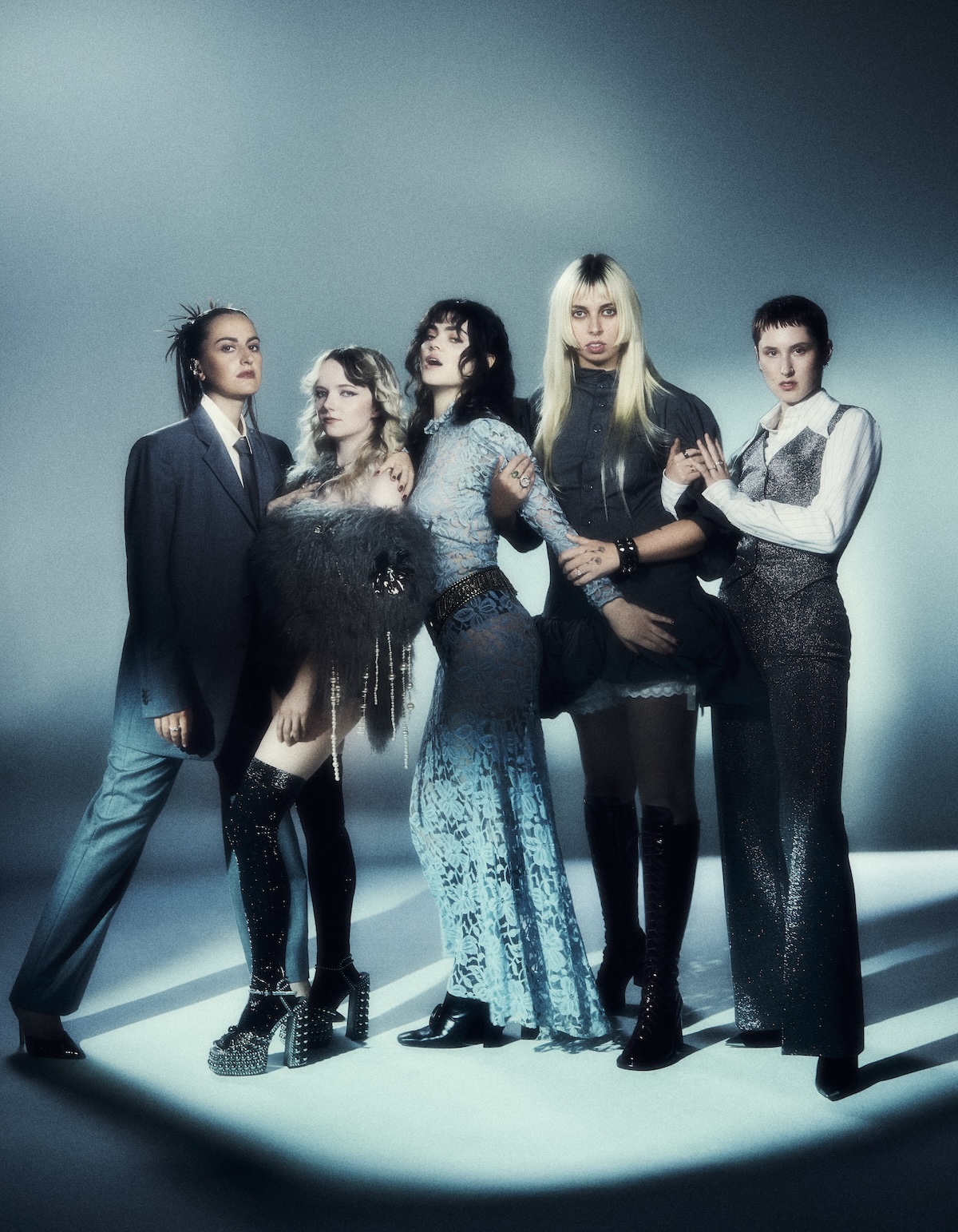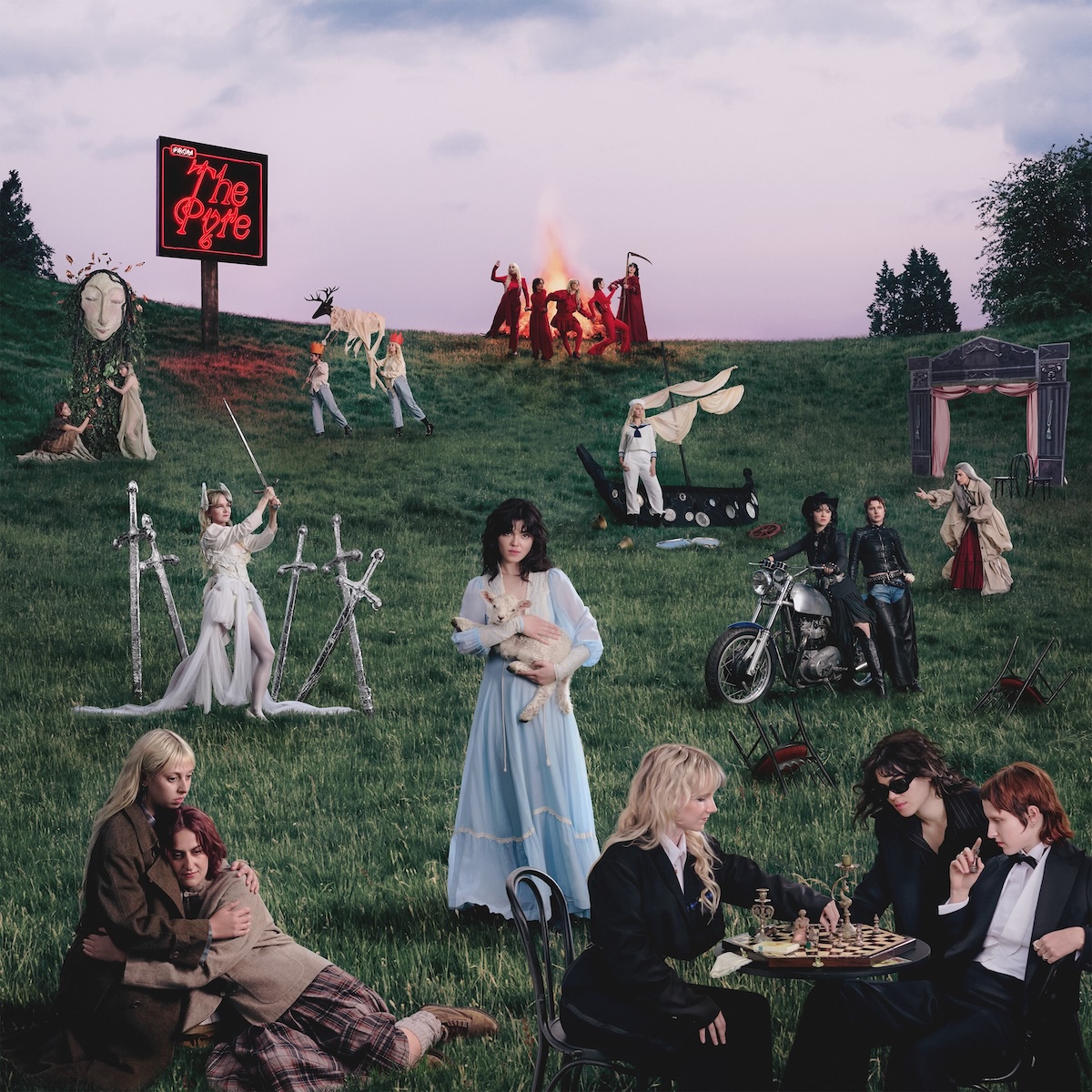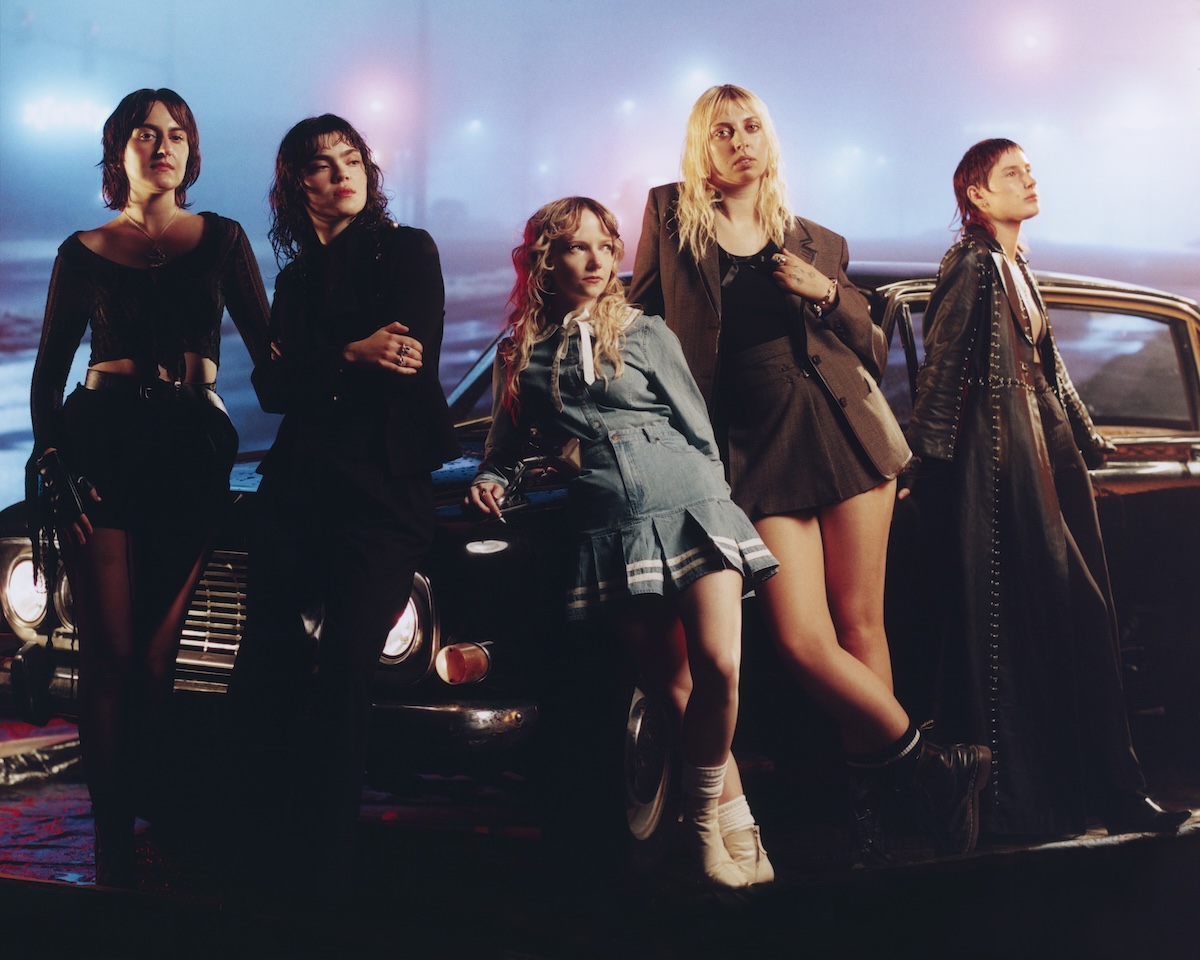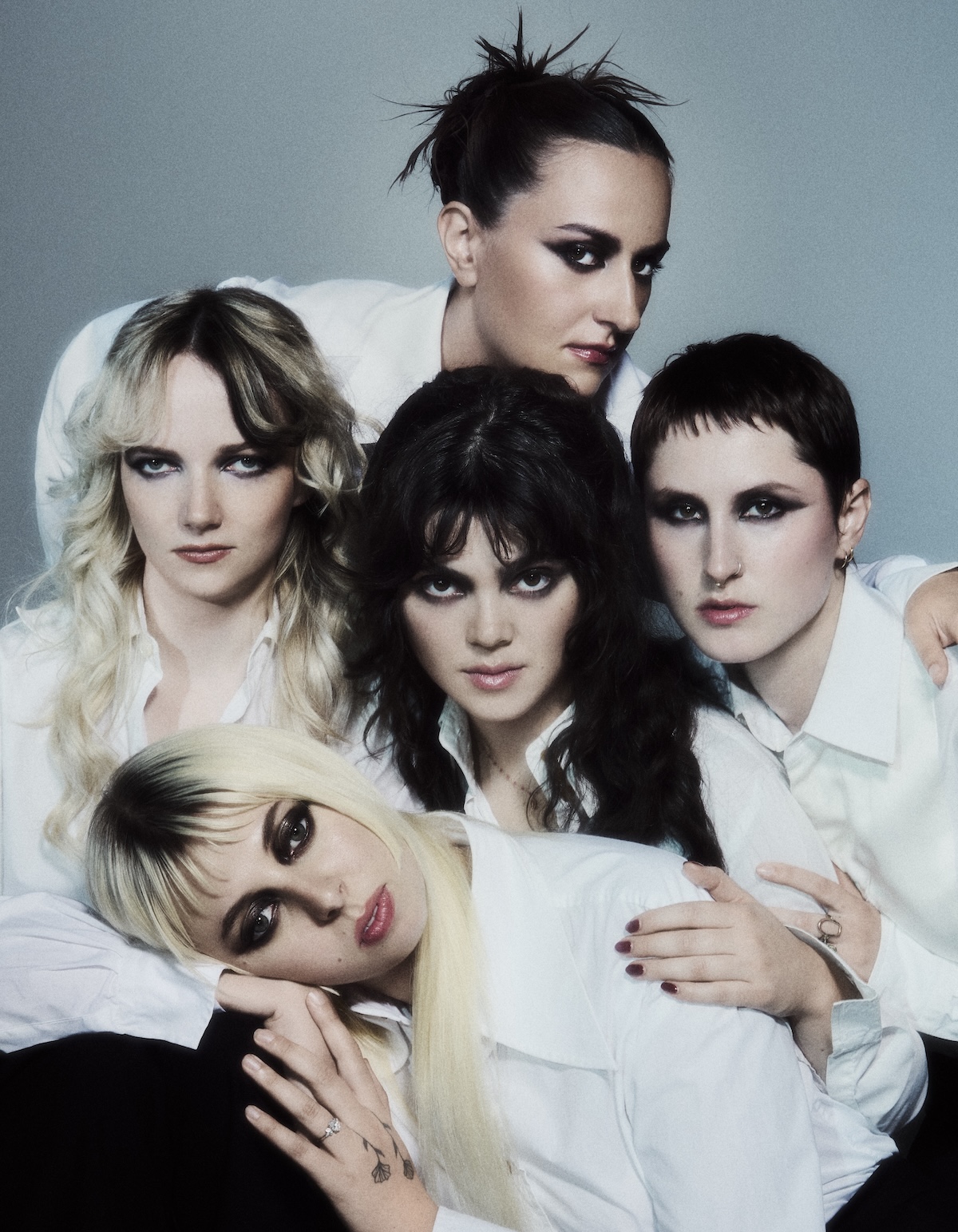Over the course of an hour-long interview with Abigail Morris, Emily Roberts, Lizzie Mayland, and Georgia Davies of the Last Dinner Party, it feels like I’m sitting front row in their own private fashion show. Mayland appears in a top that’s part faux fur and part denim with straps and stripes, a textural overload. Morris is in a white button-down with one arm covered in a sleeve and a strap over the other arm. Roberts is wearing a pretty pilgrim-style dress that she says is her own, but when I suggest it could be worn on stage, she looks down and says, “I suppose so.” The group—which includes keyboardist Aurora Nishevci—is being styled for their upcoming tour in support of their second album, From the Pyre, and their excitement is contagious.
“We haven’t had a stylist style a tour before, or certain looks for a tour,” says guitarist Mayland. “It’s about having looks that are cohesive across the five of us but still having elements of individuality and tailoring the silhouettes or the vibe of the pieces to each person specifically. But also creating this visual world amongst the five of us that is more unified than we’ve been able to do before. It’s really exciting adding someone else’s talents to our world. The stage design is going to tie in with that. Hopefully people will leave thinking they’ve got their money’s worth. From the music to the visuals to the outfits has stepped up.”
It’s difficult to imagine the Last Dinner Party stepping up from where they arrived, which was at the top. They collected the BRIT rising star award in 2024 and best new artist in 2025 in their native U.K. Their flawless, critically and commercially acclaimed debut album, Prelude to Ecstasy, produced by James Ford, was nominated for the prestigious Mercury Prize. They were so perfectly formed on every level, musically and aesthetically, it didn’t seem like they could be real, and there was much speculation and accusation that they were manufactured. You just had to see them live once to know they were the real thing.
From the Pyre comes barely a year and a half after Prelude to Ecstasy, a speedy follow-up by any standard. It doesn’t have the stickability of its predecessor or the unconscious need to exaggerate the lyrics when you sing along to it, but, at the same time, it represents the whole group with contributions from every member. It’s also a lot more subdued of an album, but, understandably, they seem even more excited about it than their debut.

You can imagine this album arriving a year and a half after your debut came as quite a surprise.
Georgia Davies: I love that element of taking people by surprise. Even though the first album came out a year and a half ago, we had been playing the songs for years and years, since 2021. We were pretty much just gagging to get in the studio and record new stuff. To tour the new stuff, you have to release the album, so we were like, “Let’s just do it.”
Lizzie Mayland: Maybe it does feel quick, but it doesn’t feel rushed. After all that touring, we were desperate to get back in the studio and enjoy writing and making music together. It was a part of the job that we hadn’t been able to do for so long.
Emily Roberts: We were all hungry to write again, and to be creative and write things that are different to album one, do things that push us a little bit more vocally or instrumentally. We definitely had enough time to actually record, but sometimes you can feel the pressure of everyone putting things out quickly because people become forgotten about and irrelevant so quickly. I personally experienced that pressure, but we were ready, and we did have enough good songs to go in confidently and say, “We’re ready to do album two.” But I suppose that’s always a difficult decision because when is anyone ready?
All of you were involved in the writing of this album. Did that make it easier? Was there an adjustment from the way you worked previously?
Abigail Morris: No, because I wrote most of the songs in their initial structures, and I love doing it. None of us see songwriting as a chore or as a load to bear. It’s an honor. It’s what I do every day. It gives me energy. It felt maybe more collaborative on this record, because I bring in the finished song with piano and vocals, and then it would transform into a whole other beautiful thing. Doing that together, being challenged and pushing each other, working like that is really a beautiful thing.
I feel like I’m a better writer, which is nice to feel like you’re improving, and there’s always a craft that could be nurtured. One of the great shames and killers of creativity is when you have a success that happens very quickly, it can tend to make you coast and rest. I definitely found myself doing that, also because I was in a state of inertia. I feel like often the first record can make you so depressed as an artist. It’s like telling a sheepdog that it has to stay in the house. You just go insane. You start biting your feet off.
The best thing, when as an artist you’ve had some successes, is to keep nurturing that urge and that feeling of childlike curiosity and creativity, because you’ll always be learning, and that’s the best state to be in. My outlook on writing, at the moment, is that I can only keep finding out more and trying different things and getting better. It feels really nice to feel like I’m moving forward, rather than just sitting in it.

Your outlook must have changed a great deal from the first to the second album. How did that affect the songwriting?
GD: Because we’re all perfectionists, on the first record, we had had all of those years of changing little bits, making them as good as possible, and not really having an audience who noticed anything. Now, if we change any part of a song, people are like, “They’ve reworked this,” or “They’ve redone that.” With the first one, we didn’t have the pressure of being observed. For this album, we struggled for a little bit to be able to commit to parts and be like, “Okay, I don’t know how it’s going to test run on the road, but I’m happy with this.”
ER: I was quite inspired by the success we’d had with the first record and with “Nothing Matters,” especially, I felt quite empowered to write. I was like, “Oh, people actually do like this band.” It gave me motivation to write my own stuff to bring to the group. I’ve heard a few critics say it feels like a collection of songs, which it is because it’s literally different writers writing songs. It probably does feel different from a cohesive perspective, because it is different people’s stories.
LM: That wasn’t intentional. We weren’t like, “Let’s make sure we cover different bases.” It was more just pushing each song to the most extreme version of itself. Sometimes we pulled it back a little bit, sometimes we left it at the most extreme, going all the way in with a big guitar solo, big group vocals, “Let’s make it a Rolling Stones stadium song.” We did that for every song. That meant they ended up in different places from each other, but I hope there’s still some thread of identity throughout it.
AM: When you experience a loss or a trauma young, it takes a really long time to process it. It’s not easier to talk about, but I am slowly processing it in real time. When it happens to you when you’re young, what happens is your body will find whatever way it can to cope with it and to defend you. That keeps you going until you can get to a point where you’re old enough and secure enough to then start unpacking everything. But that takes a long time, because you have had these coping mechanisms in place that help you get through it, but that are not useful for processing grief. It’s a long process.

You started the album with James Ford, who produced the first album, but had to switch producers to Markus Dravs after James was diagnosed with cancer. How did that impact you?
LM: Professionally, [working with James] was a big safety blanket because James is so lovely to work with. He’s so generous and kind, and makes it such an equal playing field in the production room, which he easily could not. He’s got such amazing chops. It was really upsetting and really scary in a personal way as well that he was just suddenly so ill and had to leave the project completely. It was foundation rocking. It was a hard, hard thing.
AM: We approached this album in quite a collage-based way. We didn’t have an idea of a conceptual record. We didn’t have a goal. We just took it on a song-by-song basis. The main thing we wanted to have was freedom for every song to allow it to get where it needed to be. It was that openness and playfulness that we set out to make the record with James.
ER: We basically did two weeks in his studio, brainstorming on the songs, seeing what direction they should go in, which was really fun. James worked on the early stages of five or six songs: “This is the Killer Speaking,” “Count the Ways,” “Woman is a Tree,” the heavier rock songs. It was kind of great to get two different producers’ interpretations of what the songs should be and where they should go. That was really interesting to see as well.
We considered a few different options, but we really loved Markus’ discography. It stylistically made sense. He’d done Florence, Coldplay, Bjork, Brian Eno, Wolf Alice. That alternative pop/alt rock, bit of Arcade Fire, aligns with what we’re doing. We didn’t want to go for someone who’s a shiny, perfect pop producer. That’s not really the sound of this album. It’s quite retro, almost like, ’60s-, ’70s-inspired, and guitar heavy.
GD: You expect a certain way of working and you feel a comfort in that, and the reassurance that it’s going to be the same as last time. One similarity between James and Markus is that they have such a diverse portfolio. Even though they have their own stamp on things and are able to massage songs into the best state they could be, they also don’t have a signature sound, and their range is really exceptional.
Working with someone new was also a good challenge, especially for us when we have an interest in production and a dream to one day be able to self-produce everything in-house, it’s great to learn things from different producers and different styles. We’re always trying to expand on pre-existing skills and getting rid of the editor or the subjective voice and yearning to learn more and be a more skillful musician, a more well-rounded person. Individually, we have our roles within the band, but we also want to keep expanding as a group of people, as an artistic collective.

Experiencing your live shows, you create a safe space for your audience, which feels very inclusive and communal.
AM: When you start having bigger shows and sensing how people might feel and how the crowd might be overheated or too packed, people can feel anxious about speaking up if they need help, if they’re dehydrated or if they’re hurt, because they’re worried about ruining the show or upsetting other audience members. Making it clear that you’re not going to be in trouble if you need help is what I would want to hear if I was in a crowd. We can restart a song. It’s not the end of the world. People should always feel like they can get help in a show, otherwise it’s irresponsible.
What do you feel would be helpful for the music industry to have in place for new artists?
AM: Our label offered therapy, which is really amazing. That’s a huge, great step forward. The big thing for us was that when we went on tour for the first time, we had no idea of the toll it would take. We bit off more than we could chew and ended up suffering because of it. So I wonder, if in teams, when there’s a tour to be booked, to have a third party who has experience with that sort of thing to point out a tour to a new band and say, “That’s four weeks, and you’re on the road, and you’re going to feel like this after three weeks,” just so they have an idea of how intense it’s going to be. It’s so hard when you’re a new band because you need to take every opportunity that comes, and it feels like every opportunity is so finite, so you end up overdoing it. It would be helpful to have an advisor in that respect.
Do you think you would have listened to them?AM: I don’t know, is the thing.
Catch the Last Dinner Party during their 2026 North American tour starting in Austin, Texas, on March 27.

Leave a comment